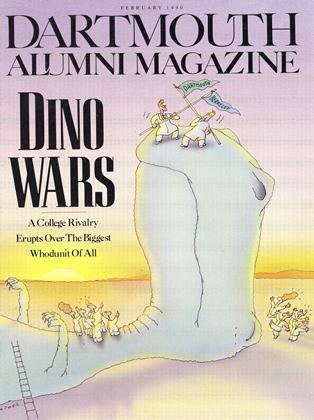What dunit? What killed the dinosaurs: comets or volcanoes? The Berkeley scientists think comets. The Dartmouth researchers think volcanoes. Both sides agree that clues to the mystery lie in a narrow band of rock in the Italian Appenines. But they disagree about the way that samples should be collected and recorded.
The Clue: So they agreed on a friendly scientific duel. Meeting last September near the medieval town of Gubbio, the Berkeley Bombardiers and the Dartmouth Detonators chipped away at rock alongside a road near town.
A boundary of clay clearly shows the boundary line between the Cretaceous and Tertiary epochs—the geological "moment" when the dinosaurs appear to have been wiped out.
The Contest: The rocks contain unusually large quantities of iridium, a metal often found in meteors and spewed from volcanoes. If the iridium is found in a narrow band, that backs up the Berkeley scientists' theory that one or more meteors smashed into the earth 65 million years ago, causing fires and smoke that destroyed the food chain. If the iridium is found in a wide stratum, Dartmouth will win the round: a broad band containing the substance will support the College researchers' contention that massive volcanoes in India and elsewhere contributed to the dinosaurs' demise.
The Referee: Robert Ginsburg of the University of Miami super-vised the collection of samples that both sides can accept. The rocks have been sent to laboratories around the world. Results aren't expected until this spring.
Gary Johnson collected the Italian rock for Dartmouth.
 View Full Issue
View Full Issue
More From This Issue
-
 Cover Story
Cover StoryDino Wars
February 1990 By Roving Writer Robert Sullivan '75 -
 Feature
FeatureSon of a Gun for soda
February 1990 By Charles Wheelan ’88 -
 Feature
FeatureIf You Thought the Comps Were Hard, Try This Quiz
February 1990 By Nancy Staab '90 -
 Feature
FeatureNorthern Lights
February 1990 By Charles Wheelan ’88 -
 Article
ArticleDr. Wheelock's Journal
February 1990 -
 Article
ArticleTHE ETHICS OF THE BOMB
February 1990 By Professor Walter Sinnott-Armstrong







